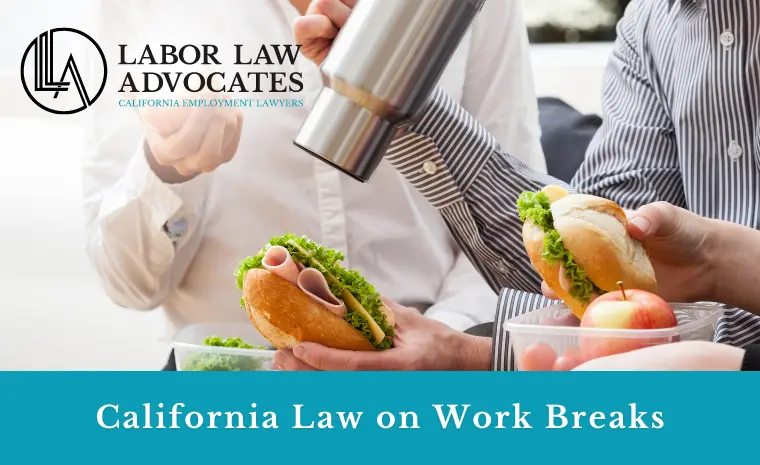California Law on Work Breaks
In today’s fast-paced and demanding world, the concept of taking regular work breaks may sometimes be overlooked or undervalued. However, work breaks are not merely a luxury or a distraction from productivity; they are an essential aspect of maintaining a healthy and efficient workforce.
These intervals of rest during the workday play a vital role in promoting physical well-being, enhancing mental acuity, and fostering a positive work environment. In recognizing the significance of work breaks, many countries have established laws and regulations to protect employees’ rights to rest and recuperation, and California is not an exception.
These laws aim to strike a balance between productivity and the well-being of workers, acknowledging that overworking can lead to burnout, decreased performance, and detrimental effects on physical and mental health.
In this article, we will discuss:
- What are work breaks, and why are they essential?
- California law on work breaks
- Penalties for non-compliance
What are Work Breaks and Why Are They Essential?
A work break refers to a scheduled period of rest or time away from work-related tasks during the workday. It is a temporary interruption in the work routine that allows employees to pause their job duties and responsibilities. Work breaks can come in various forms, such as meal breaks, rest breaks, coffee breaks, or short breaks for personal necessities.
Work breaks are important for several reasons:
1. Physical well-being – Work breaks provide an opportunity for employees to stretch their muscles, relax, and alleviate the physical strain that can result from prolonged periods of sitting or repetitive movements. Regular breaks can help reduce the risk of musculoskeletal problems and promote better overall physical health.
2. Mental rejuvenation – Continuous work can lead to mental fatigue, decreased focus, and reduced productivity. Taking break periods allows the mind to rest and recharge, enhancing cognitive function, creativity, and problem-solving abilities. Employees return to their tasks with a clearer and more focused mindset.
3. Stress reduction – Work breaks offer a chance to temporarily step away from stressful situations or demanding workloads. These brief respites can help reduce stress levels, prevent burnout, and contribute to better mental well-being.
4. Enhanced productivity – Contrary to the belief that constant work leads to greater productivity, studies have shown that regular breaks can improve overall work performance.
5. Improved morale and job satisfaction – Employers who promote and encourage adequate breaks demonstrate a concern for their employees’ welfare. This can foster a positive work culture, boost morale, and increase job satisfaction among the workforce.
6. Social interaction – Break times provide opportunities for employees to interact with their colleagues in a more relaxed setting. This can strengthen workplace relationships, encourage teamwork, and create a supportive workplace environment.
7. Personal time – Work breaks allow employees to attend to personal needs, such as making important phone calls, handling personal errands, or simply taking a moment to de-stress and recharge.

California Law on Work Breaks
In California, work breaks refer to the legally mandated rest periods that employers are required to provide to their employees during the workday. These breaks are designed to ensure that employees have time to rest, eat, and recharge, promoting their health, well-being, and productivity. The specific California law work break requirements are as follows:
Meal Breaks
- Duration – Employees who work more than five hours in a day are entitled to a 30-minute unpaid meal break.
- Timing – The lunch break should be provided no later than the end of the fifth-hour work shift.
- Meal break waivers – If the total workday is no more than six hours, the meal break can be waived by mutual agreement between an employer and the employee. However, it is generally encouraged to provide meal periods even for shifts shorter than 6-hour shifts.
- Second meal break – For employees working shifts lasting ten hours or more, an additional 30-minute unpaid meal break is required. The second 30-minute meal break should be given by the conclusion of the tenth hour of work.
Rest Breaks
- Duration – Employees are entitled to a paid 10-minute rest break for every four-hour work period or a major fraction thereof. A “major fraction” generally means any time worked beyond two hours and up to four-hour shifts.
- Timing – 10-minute paid rest breaks should, if possible, be provided in the middle of each work period. However, it is essential to ensure that employees have the opportunity to take their ten-minute rest breaks during their shifts.
- Restroom breaks – In addition to the regular rest periods, employers must also permit workers to use restroom facilities during employee work hours.
Lactation Breaks
- Duration – California Labor Code 1030 states that every employer shall provide a “reasonable amount” of break time to accommodate an employee who needs to express breast milk for her infant child. The additional break time is generally apart from the regular meal and rest breaks provided to all employees.
- Timing – The law does not specify the exact number or duration of lactation breaks, as it may vary based on individual needs. Employers are encouraged to engage in a cooperative process with their employees to determine what constitutes a reasonable amount of break time giving them ample opportunity to accommodate this need.
- Private location – Employers must provide a private space or accommodations for employees that are nursing to express breast milk.
It’s important to note that these work break requirements are designed to protect the health and well-being of employees and are enforceable under California labor laws. Failure to provide employees with their entitled breaks or any attempts to discourage or prevent them from taking these breaks can lead to legal consequences for employers.
Penalties for Non-Compliance
The penalties for employers in California for non-compliance with work break laws can be significant. California takes the issue of work breaks seriously to protect the health and well-being of employees. If an employer fails to provide employees with the required meal and rest breaks or discourages them from taking breaks, they may be subject to the following break penalties:
Premium Pay for Missed Breaks
If an employer fails to provide a required 30-minute meal break, they may be required to pay an additional 1-hour’s wages at the employee’s regular rate for each workday that the meal break is not provided. This additional pay is known as “premium pay” and is in addition to the regular wages owed to the employee.
Premium Pay for Late or Short Breaks
If an employer fails to provide a required rest break or does not provide the full 10 minutes, they may also be required to pay the employee premium pay for the missed or shortened break.
Waiting Time Penalties
In cases where an employer does not provide required breaks or premium pay upon termination of employment, they may be subject to waiting time penalties. Waiting time penalties can equal a day’s wages for each day the employee had to wait to receive the owed break premiums, up to a maximum of 30 days.
Legal Claims and Lawsuits
Employees who believe their employer is not complying with work break laws may file complaints with the California Division of Labor Standards Enforcement (DLSE) or bring wage claims. If found guilty of non-compliance, employers may be required to pay back wages, penalties, and other damages.
Class Actions Lawsuits
In cases of widespread non-compliance affecting multiple employees, there may be grounds for class action lawsuits, which can lead to substantial liabilities for the employer.
It’s important to note that these penalties are not exhaustive, and there may be other consequences for non-compliance with work break laws in California. To file a successful claim, it is in your best interest to hire an employment lawyer who can help you navigate through the intense claims process.
Get the Legal Help You Need!
If your employer violated the legal obligation to offer the mandated California law work breaks, you may take legal action against your employer.
You do not have to face these legal issues alone. Labor Law Advocates’ experienced lawyers are here to provide you with the legal guidance and representation you may need to fight for your right.
Labor Law Advocates is a California-based employment law firm that focuses on helping employees and labor unions protect their rights. Our knowledgeable attorneys have successfully represented clients in disputes against employers for wage theft, wrongful termination, discrimination, harassment, and other concerns.
Call us at (424) 688-3632 for a free case consultation. We are available 24/7.




